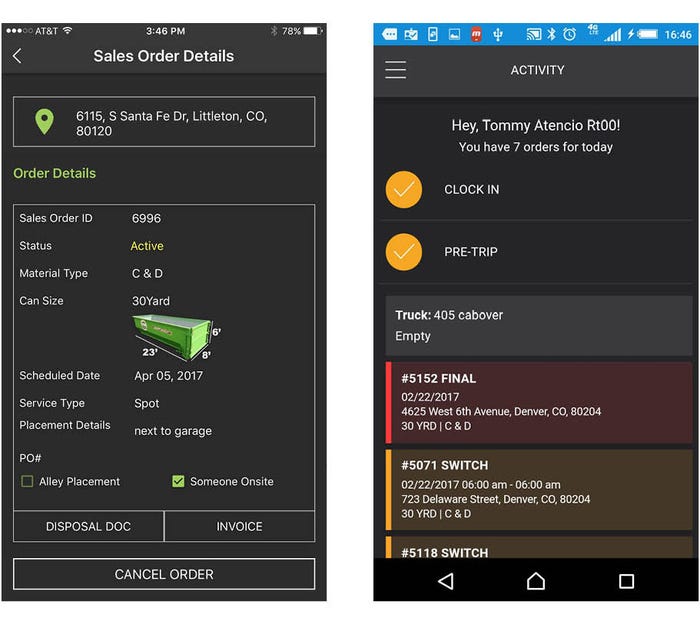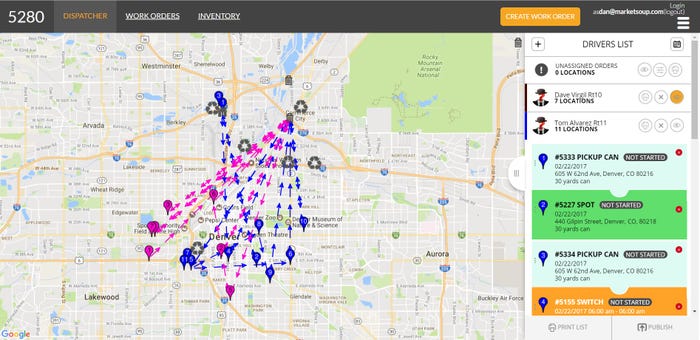Independent Roll-off Company Creates Operating System Software to Streamline Business
Bill Bradley, CEO and founder of both 5280 Waste Solutions and Starlight LLC, discusses Starlight software and its effect on the roll-off business.

Typically, roll-off companies remain small due to the complex nature of the business. With so many moving parts, it is a challenge to manage inventory, customer needs, change orders and drivers.
5280 Waste Solutions, a Denver-based roll-off company, is changing the game with its Starlight LLC software that helps manage the process in real time. The software as a service (SAAS) includes multiple interworking modules, mobile apps and cloud-based applications integrated to deliver an operating system connecting customers to sales and customer service representatives to dispatch to drivers.
Waste360 recently sat down with the CEO and founder of both 5280 Waste Solutions and Starlight, Bill Bradley, to discuss the software and its effect on the roll-off business.
Waste360: How did you get into the roll-off business with 5280 Waste Solutions?
Bill Bradley: I started 5280 Waste Solutions six years ago. In that time, we’ve grown to be the largest independent roll-off company in Colorado, running 30 trucks and fielding more than 1,600 containers. 5280 Waste is distinguished in our marketplace by being high service or high touch and by providing just-in-time, on-demand responses to customers.
Waste360: What is the relationship between 5280 Waste Solutions and Starlight?
Bill Bradley: I started and lead both companies. Each company has separate staff and management. Starlight uses the 5280 operating company as a work bench and test lab for new developments. This fact distinguishes Starlight from other trash hauling software, which comes from disconnected, independent software houses without daily hands-on, problem-solving experience at an operating level.
Waste360: Why did you create the Starlight software?
Bill Bradley: Starlight software is the key to the growth of 5280 Waste from eight to 30 trucks.
The main reason most roll-off companies are small—in the two to five truck range—is because the business is horrendously complex. There are many moving parts: location (customer versus disposal versus inventory), daily traffic fluctuations, seasonal impacts on demand, driver shortages, high equipment costs and severe competition. Without the real-time information and automation provided by Starlight, it is essentially impossible to gain the economies of scale present in most other industries. For example, it is commonly known that roll-off companies with just a few hundred containers can’t keep track of their inventory, forcing them to constantly manually count dumpsters. Roll-off companies essentially run blind without real-time awareness and coordinated control of container inventory, pending work, changing work, truck and driver status, documentation and just-in-time customer requests.

To overcome these challenges and to grow 5280 Waste to capitalize of the market opportunity, the Starlight software grew organically out of the operations of 5280 Waste. Extremely rapid growth and the associated logistical and efficiency challenges of operations combined with our best-in-market, uncompromising customer service led us to design and build Starlight software to function unlike any other software. We’ve been continuously building software inside the operating company for over three years. We’ve had developers riding in trucks for years, sitting in dispatch, answering phones, taking orders, working with contractors in the field … all of this combines to create a product that solves real-world problems. Further, we’ve chosen the first handful of Starlight customers based on our ability to partner with them to expand the functionality beyond what 5280 does with just roll-off today. For example, one of our first major customers is a nationally recognized construction and demolition (C&D) recycler. It’s a natural extension of the Starlight product to be able to track trucks and materials and manage and bill for full C&D recycling operations. We have plans to expand into other areas of hauling and materials management as well.
Waste360: How does the Starlight software work?
Bill Bradley: Starlight operates as a service to our customers served up over the Internet. The SAAS includes multiple interworking modules and is essentially mobile apps and cloud-based applications integrated to deliver a seamless operating system that connects customers to sales and customer service reps to dispatch to drivers.
It is integrated live from end to end, for real-time information and elimination of errors from multiple data sources; cloud-based to enable mobile activity for drivers, customers and roll-off staff [work from home or out of town]; and based on the idea that an on-demand business is all about real-time information and great customer service. The systems run live, synchronously as one single organic entity from one end to the other.
Waste360: What is the technology behind it?
Bill Bradley: Starlight is built using state-of-the-art, cloud-based programming languages and tools and the latest mobile communication technology, all running live together in a single integrated platform.
Waste360: How has 5280 Waste Solutions benefitted from the software?
Bill Bradley: Some interesting facts are that 5280 is realizing a 10 to 20 percent increase in paid hauls per truck per day. We are seeing a dramatic improvement in customer service—mobile app-based ordering and account management and delivery notices. We finally have financial data we can use effectively, including superior analytics for individual customer profitability. We have complete, live awareness of our inventory, so we serve customers much more effectively and dispatch trucks more efficiently.

Waste360: What were some of the challenges in implementing the software?
Bill Bradley: The challenges were in the initial design and building of the application. Much of what we had to do here was plowing new ground. We built Starlight because I couldn’t find anything in the industry that did close to what we needed to control and scale our business. New systems and controls had to be invented. The actual implementation was relatively easy, even drivers picked it up within a day or two at most. I credit the fact that we had programmers living in this world day in and day out building systems based on exactly how the industry actually works, not some abstract model of what someone thought should be happening.
Waste360: What major U.S. waste and/or recycling companies use the app?
Bill Bradley: We have contracts and subscription agreements with several major companies representing hauling and recycling from coast to coast, but it’s premature to release name information until our customers are ready.
Waste360: How does it benefit the waste and recycling industry?
Bill Bradley: Starlight has clear, measurable benefits to companies in higher operating efficiency and higher profits. But, in addition, because the Starlight system captures, records and organizes information about materials, volumes, jobsites, property types, points of origin, points of destination, diversion and recycling percentages, the whole state of the industry is advanced through visibility into what is getting hauled—where it comes from, what happens to it, who is doing the work, who is responsible, what the outcomes are, etc. For the first time, this information is available in sharp detail and available in real time as work occurs.
About the Author
You May Also Like


.png?width=300&auto=webp&quality=80&disable=upscale)